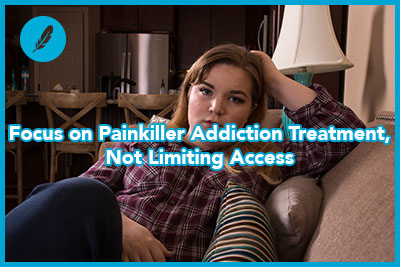Focus on Painkiller Addiction Treatment, Not Limiting Access, Says Congress

Congress is working on addressing the ongoing problem of painkiller addiction by focusing on connecting those who are struggling with the disorder with treatment rather than limiting access to painkillers for all patients, says The New York Times.
Recently, the US House of Representatives passed 18 bills with the goal of managing the opioid addiction issue across the country and has pledged to work with the US Senate to create legislation that will have a positive effect on people struggling with painkiller addiction and their families. Those bills will in part create changes including:
- Increased monitoring of prescriptions for painkillers to stop diversion and fraud
- Increased access to opiate addiction treatment
- Funding for proper and safe disposal of leftover opiate painkillers
- Assistance for states that would increase access to naloxone, a medication that can reverse an opiate overdose
- Increased access to medication-assisted treatment when appropriate
- Support of the use of treatment rather than incarceration for nonviolent drug-related criminal offenses
Rather than focusing on the wholesalers and pharmacies that are responsible for distributing the drugs and thus limiting supply, the focus has turned instead to limiting the demand. By increasing education and awareness of the risks associated with even mild to moderate use of painkillers and connecting people who need help with treatment, there will be fewer new cases of opiate addiction and, hopefully, fewer people living with addiction and the ongoing risk of overdose.
Signs of a Painkiller Overdose
Opiates can depress breathing, causing a person’s breath to be shallower and slower than usual. If someone takes too large of a dose of an opiate painkiller – or combines use of the pills with another respiratory depressant like alcohol – it can cause breathing to stop entirely. Without someone there to help them start breathing again through CPR or with naloxone, the event can be fatal.
Unfortunately, many people die of an opiate overdose because it is not a dramatic medical emergency. Rather, the person may appear to be asleep and not in crisis at all.
A closer look may indicate that a painkiller overdose is happening or a risk. Signs include:
- Bluish tint to nails and lips
- Very soft rise, or no rise, to the chest due to breath
- Slowed heartbeat
- Unresponsiveness and inability to be roused
If you believe that someone is experiencing an overdose, do not attempt to revive them. Instead, call 911 immediately and tell the dispatcher that you believe an opiate overdose is happening. Then, stay on the line, provide requested information, and follow the dispatcher’s directions to help the person until emergency medical personnel arrive.
Signs of Painkiller Abuse and Addiction
Overdose can happen at any time, and any use of painkillers outside the bounds of a doctor’s prescription for legitimate pain management is drug abuse. This means that any of the following behaviors can signify a problem:
- Crushing pills before swallowing them
- Crushing pills and snorting the powder or dissolving the powder in water and injecting the solution
- Taking pills in combination with other substances, including alcohol and marijuana
- Taking pills for any reason without a personal prescription from a doctor
- Taking a higher dose of medication than prescribed or taking the drug more frequently than prescribed
- Attempting to fill a single prescription at multiple pharmacies
- Going to the emergency room to request extra pills due to loss
- Attempting to get multiple prescriptions for opiate painkillers from different doctors
Does your insurance cover treatment for alcohol and/or drug addiction?
Check your insurance coverage or text us your questions to learn more about treatment by American Addiction Centers (AAC).
Treatment Works
For those who survive an overdose, it can be the last day spent in addiction and the first day of a new life in recovery. In some parts of the country, emergency room doctors are taking the initiative and talking to patients who are admitted due to overdose about the potential need for treatment. Others are going a step further and connecting patients with a treatment program after they are revived from overdose.
The near-death experience can often be a wakeup call to those who may not have previously recognized the risks they were taking with opiate painkillers. Because the only way to guarantee that overdose will not occur is to abstain completely, treatment is the best choice. It can empower the person to immediately stop all use of addictive substances and learn tools that will help them to remain relapse-free for the long-term.
Comprehensive opiate addiction treatment should offer access to:
- Medical detox to address physical and psychological withdrawal symptoms
- Professional guidance and support
- Treatment for co-occurring mental health issues
- Peer support
- Family education and support
- Aftercare support
A Continuing Trend That Must Stop
Overdose deaths related to prescription painkiller use and abuse have steadily risen from fewer than 6,000 in 2001 to more than 18,000 in 2014 – an increase of more than 300 percent. These numbers demonstrate in no uncertain terms that the problem of painkiller abuse and addiction has become a crisis.
No one is immune. Men and women, young and old and middle aged, across every economic level and all cultures – painkiller abuse can happen without a second thought and, in some cases, it takes just one time for fatality to occur.
If your loved one is struggling with painkiller abuse or addiction, do not wait to seek treatment.